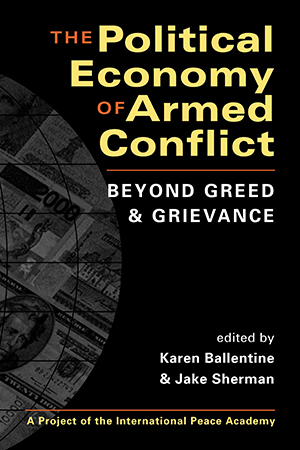Globalization, suggest the authors of this collection, is creating new opportunities—some legal, some illicit—for armed factions to pursue their agendas in civil war. Within this context, they analyze the key dynamics of war economies and the challenges posed for conflict resolution and sustainable peace.
Thematic chapters consider key issues in the political economy of internal wars, as well as how differing types of resource dependency influence the scope, character, and duration of conflicts. Case studies of Burma, Colombia, Kosovo, Papua New Guinea, and Sri Lanka illustrate a range of ways in which belligerents make use of global markets and the transnational flow of resources. An underlying theme is the opportunities available to the international community to alter the economic incentive structure that inadvertently supports armed conflict.
The late Karen Ballentine was most recently senior consultant to the New Security Program at the FAFO Institute for Applied International Studies. Previously she was senior associate at the International Peace Institute, heading the Program on Economic Agendas in Civil Wars. Her publicationsinclude Profiting from Peace: Managing the Resource Dimensions of Civil War (with Heiko Nitzschke). Jake Sherman is political affairs officer in the office of the Special Representative of the Secretary-General, United Nations Assistance Mission in Afghanistan (UNAMA).
No rights in South Asia"This timely volume sheds new light on what drives current civil wars."—Gerd Schönwälder, Journal of International Development
"Providing ample evidence of the interplay between the economic and political functions of violence in a terrific set of case studies, [this book moves] us one step further toward a general understanding of the origins and consequences of civil war."—Monica Toft, Political Science Quarterly
"An invaluable addition to the 'greed or grievance' debate in the literature on civil wars.... It should become a basic text."—Cynthia L. Irvin, International Studies Review
"This book is a huge step forward in the debate over the roles of 'greed' and 'grievance' in recent civil wars. The authors’ conceptual essays and case studies carefully examine the ways that economic opportunities and political competition combine to shape the likelihood, character, and duration of intrastate armed conflict."—Jack Snyder, Columbia University






